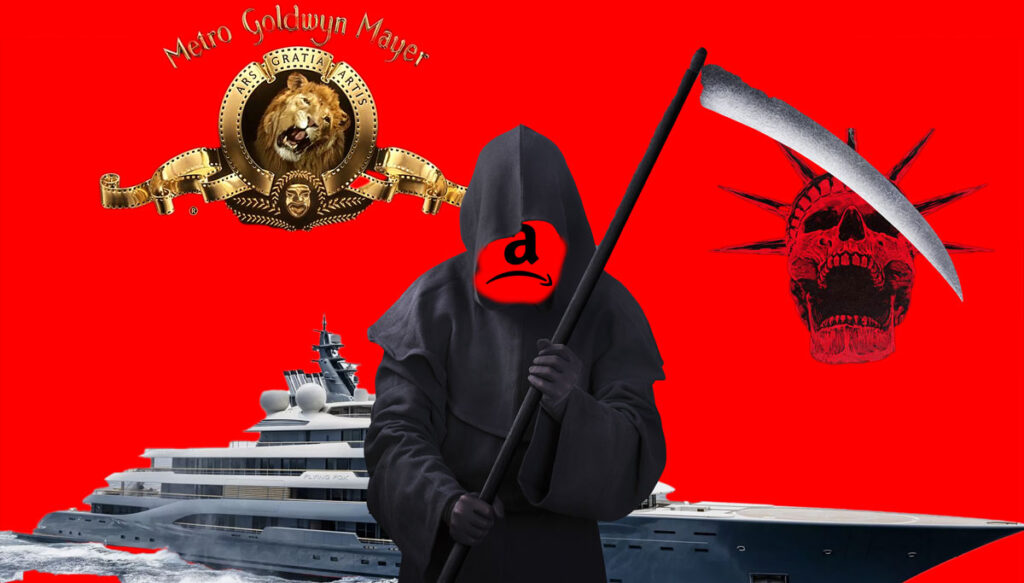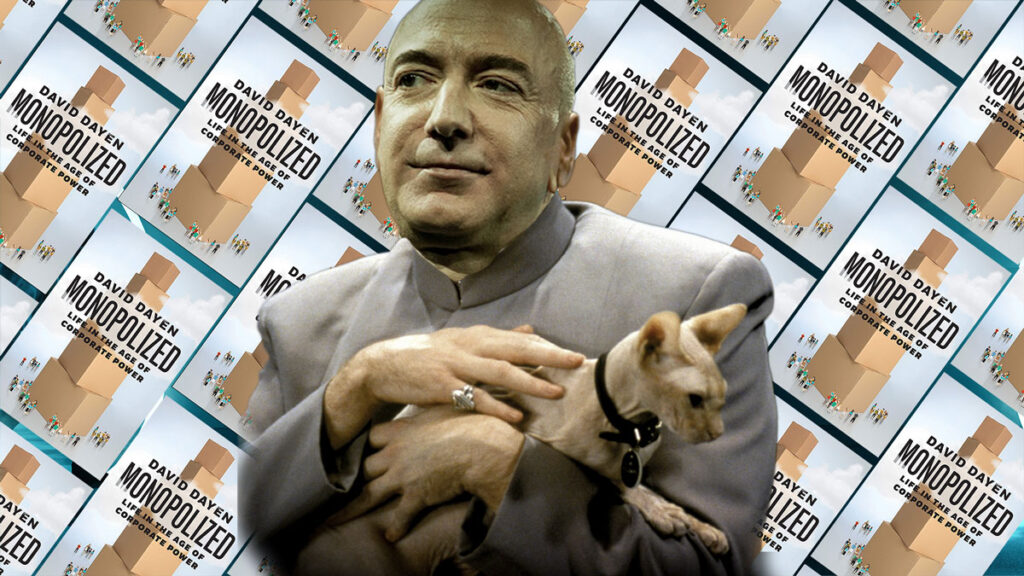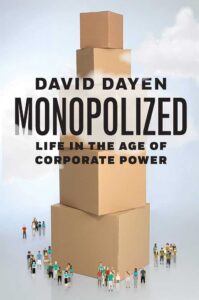Business
Amazon to buy MGM for $8.5 Billion: WTF?
Published
3 years agoon
opinions & observations

Above: Photo Collage by Lynxotic & New Press
There’s a joke somewhere in here but it’s hard to see it through the tears
Woody Allen’s onscreen counterpart, Alvy Singer, complaining about Hollywood Award Shows in “Annie Hall” remarked that a category of award for “Greatest Fascist Dictator” would not surprise him, and that Adolf Hitler would probably win.
Amazon, viewed from some neutral future date or by aliens from another planet would surely win the award for “Greatest Company to Amass Wealth & Power by Intentionally Losing Money” award. Or maybe just “World’s Biggest Ponzi Scheme”.
For now the fawning books and articles on the greatness of “Bezos’ Behmouth” continue to pile up.
An exception to the fawning fan fiction is “Monopolized: Life in the Age of Corporate Power” by David Dayen. The author also commented cogently on the current situation with Amazon and MGM. His thoughts shed much needed light on the simple and yet sadly overlooked truth about Amazon: its core mission is to monopolize not just online sales but all transactions that take place in the economy where a “cut” of those transactions can be extracted.
What’s with all these awards? They’re always giving out awards. Best Fascist Dictator: Adolf Hitler. — Alvy Singer
This viewpoint, it would seem, can be traced back to a rare case where Jeff Bezos let his guard down and accidentally explained a core concept of the Amazon business model.
He said, simply: “Your margin is my opportunity”.
With this seemingly innocuous and widely misinterpreted phrase he unleashed the dogs of hell on the world of commerce. The MGM deal, according to Dayen, who is also editor of The American Prospect, is yet another attempt to gut an industry with techniques designed to use predatory pricing strategies to crush all rivals.
The sub-head from his article states: “The company wants to control pricing on everything, and funnel as many transactions to itself as possible.”
Meanwhile, somehow, this statement is finally being generally understood in its real context.
Yet what is astounding is that this is not a supposition or an accusation, but rather is a stated fact, and how this company has behaved and operated for decades.
Putting 2+2 together, the common interpretation that there is an “innocent” pro-customer meaning possible, is finally being seen for the absurdity that it is.
Simple, Effective and Disgusting: Selling below cost or at a loss to harm competition
We’ve seen how that goes. In this case, since Amazon does not make any data available on the profitability of various business segments, using nearly $9 billion to enhance its “free with Prime” business creates yet another loss-leader opportunity to destroy the margins of all other streaming platforms, who, like other businesses actually have to make a profit or at least break even, unlike Amazon due to its cross-subsidization of products and services.
Amazon wants to control all economic activity in the United States and the world. It wants a cut of every transaction. — D. Dayen
Amazon as “cross-subsidized content devourer” is how Dayen described the inevitable outcome of the deal in his article.
He also succinctly argues that by using its virtually unlimited power and resources to devour an ever larger share of the market, ultimately the result will be to drive up costs for competitors (for I.P., production and star power) and achieve the goal of squeezing the already slim margins for those poor schmucks (or rich schmucks like Disney, HBO, Netflix, etc.) that don’t have an unlimited budget for intentional losses.
The playbook is so obvious and familiar that it’s almost laughable. That is, if not for the death and destruction that always follow in the next chapters of this plot schema.
They pick on an established industry where no one will have sympathy for the rich victims – did anyone feel sorry for Borders or other large book retailers? Does anyone cry over the loss of Diapers.com or Quidisi? When Birkenstock complains does anyone listen?
How can gutting the streaming industry or unassailable giants like Disney and HBO be bad? Isn’t it just capitalism at its finest? Should we start preparing the award now for “Greatest Consolidator of Content in History”?
But what about the “loss leader” system? What about the ultimate outcome of less competition and higher prices overall, an obvious harm to consumers, regardless of how stupid and convoluted the route is to get there?

By moving the market in a way that will make streaming a terrible business for any company that has to compete with this, “oughta be illegal” script, margins will, if the gambit succeeds, face a similar fate to the one that anyone who used to be in the retail book industry, or any of the other entire industries that Amazon has received kudos for destroying, knows all too well.
Dayen also makes the point that, once this thinly veiled ploy is seen for what it is, the harm, not only to Amazon’s competitors but to the general public, should be obvious and impossible to ignore.
Citing the similarities with the recently brought antitrust action by the Washington, DC attorney general, it is exactly this kind of pernicious practice, that Amazon has not only gotten away with for decades, but Bezos has been lionized for “inventing”.
That lawsuit, which deals with an Amazon clause in 3rd party marketplace terms and conditions (since altered to disguise its true intent) that 3rd party sellers must sell anywhere outside Amazon’s marketplace at the same or higher price that they have listed on Amazon, is a sign of a gradual shift toward seeing the real meaning of Amazon’s behavior.
Since there are massive, exorbitant fees added to every transaction for all 3rd party sellers, the only way for them to make any profit at all is to tack on the cost of those fees, meaning artificially higher prices.
Amazon has ways to retaliate through “dark patterns” of its own special stripe, by manipulating buyers behaviors on its web site, making sure that sellers that don’t toe the line will get, essentially, zero sales.
For Amazon this kind of bullying and blackmail is a “win-win-win”. They see and have tattooed into their DNA all pain, suffering and loss for anyone other than the company (AMZN) as a gain for them.
3rd party sellers caught in hell trying to survive while paying fees up to 43% or more without recourse to try and recoup by selling anywhere else at lower prices?
Amazon congratulates themselves. Sellers undercutting each other, in spite of those fees in an effort to behave like a “mini-Amazon” and getting into a race to the bottom death match with each other? Yippee! Great for Amazon, when they are dead, there are always new victims waiting in line to enter the cage.
How about sellers that obtain goods illegally, counterfeit, illegal imports, stolen products, remainders and aftermarket overstock? They are GREAT for Amazon because they put even more pressure on the individual, honest sellers to immolate themselves trying to survive (and eventually die via pricing suicide) while Amazon can claim to be offering lower prices!
Oh, and when they “do their best” to stop all those illegal sellers, albeit at a snails pace, they are bailed out by section 230 and can point to their “partners in crime”, the counterfeiters, the knockoffs from China, the illegal imports and the stolen and aftermarket goods and say: “We tried our best, these are just a few bad apples” laughing all the way through every board meeting.
“Your margin is my opportunity”, indeed.

Above: Photo Collage by Lynxotic
There are no mitigating factors here. There is no “good guy” or customer obsessed hero. Just evil and the dead or dying. Wake the fuck up, America.
The praise and adulation continues, even as the $400 million yacht is being prepared for its maiden voyage
It’s as if Bezos is given award after award for the “genius” of selling 1$ bills for .75 cents. Championed for using a strategy that masquerades short term margin destruction as “customer obsession”, pretending that the dumping levels of pricing won’t in the long run flip into price gouging and the destruction of competition.
Somehow the massive detriment to consumers and the society at large is overlooked amid all the parties celebrating the “genius”.
But have the chickens finally come home to roost? Is anyone seeing a pattern of systematic use of the same tactics over and over, applied to each and every sector that Amazon chooses to “disrupt”? They didn’t get the nickname “grim reaper” for nothing. The problem is that it was meant as a compliment.
It is a sea change in the antitrust orientation, a sea change that is desperately needed, and with Lina Kahn and Columbia Law School professor Tim Wu, it might be just over the horizon. Could even have a chance to come about.
That change, so long overdue, could finally begin the process of dismantling the damage wrought and and still to come, if there is no interdiction.
The worm will eventually turn. When? After decades of obvious abuse and criminal behavior, completely and willfully ignored (too complicated to see).
Will there eventually be so many victims that they will outnumber the duped and the sycophants? Stay tuned.
Monopolized: Life in the Age of Corporate Power
David Dayen (Author)
This is a world where four major banks control most of our money, four airlines shuttle most of us around the country, and four major cell phone providers connect most of our communications. If you are sick you can go to one of three main pharmacies to fill your prescription, and if you end up in a hospital almost every accessory to heal you comes from one of a handful of large medical suppliers.
Over the last forty years our choices have narrowed, our opportunities have shrunk, and our lives have become governed by a handful of very large and very powerful corporations.
Today, practically everything we buy, everywhere we shop, and every service we secure comes from a heavily concentrated market.
Dayen, the editor of the American Prospect and author of the acclaimed Chain of Title, provides a riveting account of what it means to live in this new age of monopoly and how we might resist this corporate hegemony.
Through vignettes and vivid case studies Dayen shows how these monopolies have transformed us, inverted us, and truly changed our lives, at the same time providing readers with the raw material to make monopoly a consequential issue in American life and revive a long-dormant antitrust movement.
Related Articles:
- Is 2023 the year for Virtual Reality Workouts?
- Fitness with Apple Watch: A Day in the Life of Highly Motivated Ring Closers
- Goodbye Twitter, Hello Mastodon!
- The Vision of Steve Jobs for the Future of Apple has Barely Begun to Emerge
- Is This Jason Statham Video Real or Deepfake TikTok Account? You Decide

Find books on Money and many other topics at our sister site: Cherrybooks on Bookshop.org
Enjoy Lynxotic at Apple News on your iPhone, iPad or Mac.
Lynxotic may receive a small commission based on any purchases made by following links from this page




